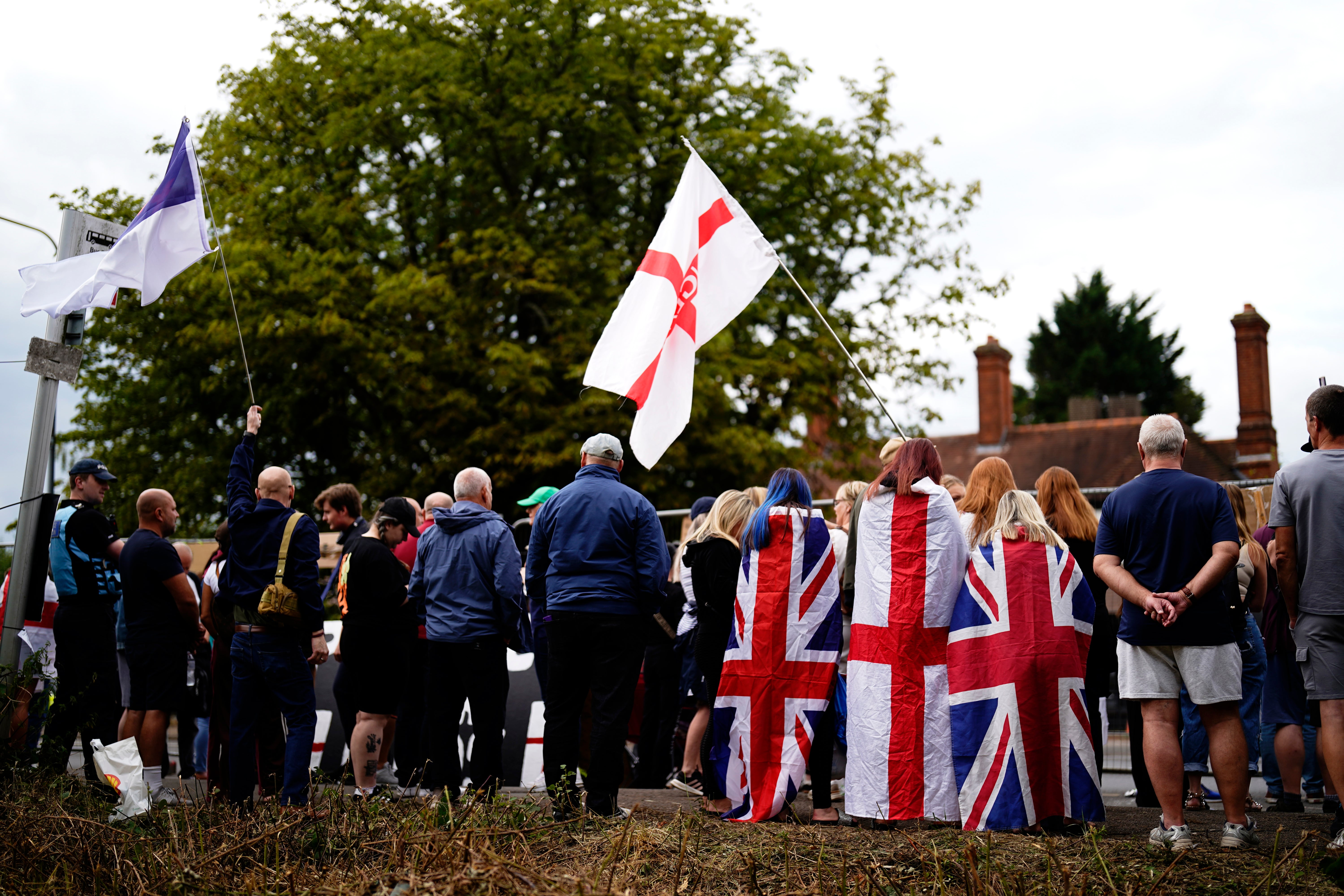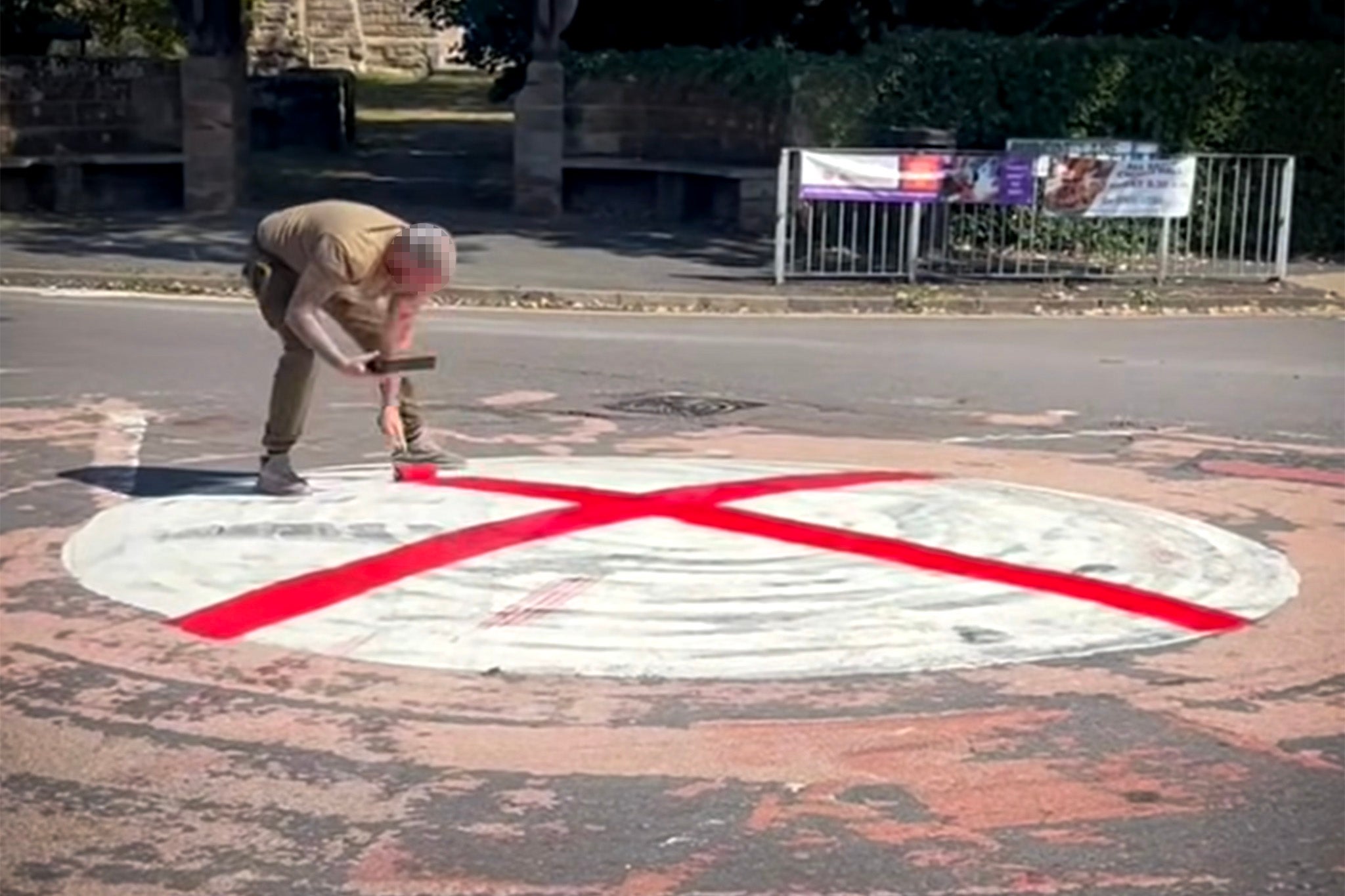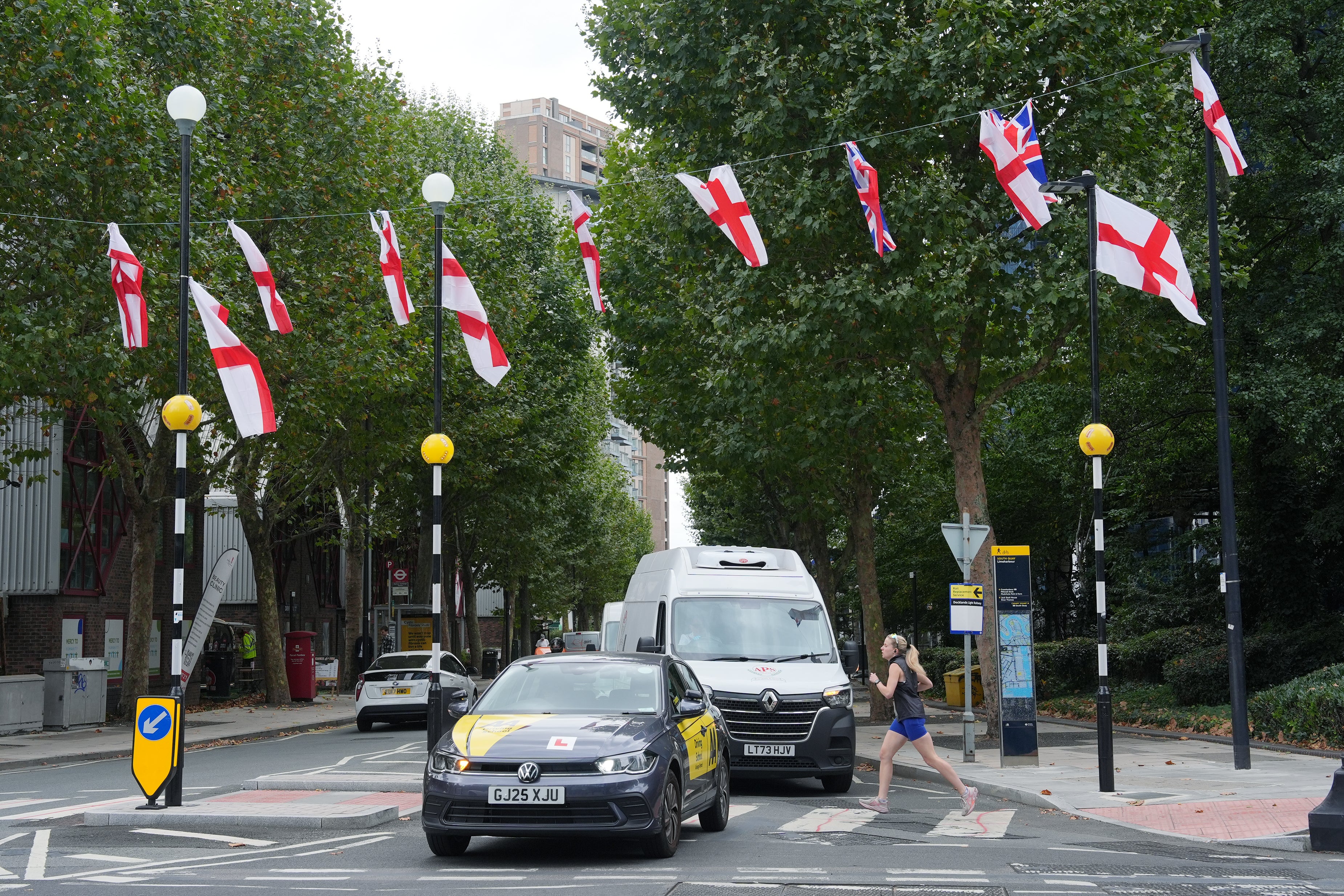It’s hard to pinpoint when it happened – the exact moment when the England flag went from being a benign show of patriotism to a dog-whistle call to racism.
At one point, the St George’s flag was even considered the “safe”, more inclusive alternative to the union jack, the latter having been co-opted by the National Front in the late 1970s. Football was arguably the driving force behind this: in a 2019 speech, former Labour leader Ed Miliband said: “Since Euro ’96, English football fans have helped to reclaim the flag of St George from the BNP.” Sociologists Paul Bagguley and Yasmin Hussain, meanwhile, described in their 2005 essay, “Flying the Flag for England? Citizenship, Religion and Cultural Identity among British Pakistani Muslims”, how St George’s flags were displayed from the windows, shops and taxis of Bradford’s British Pakistani population during the 2002 World Cup. “The St George’s flag was felt to represent a multi-ethnic Britain, whereas the union jack is associated with colonialism and white racism,” they wrote.
But somewhere between Labour MP Emily Thornbury’s infamous 2014 tweet, Brexit, a run of anti-immigration PMs and the swift rise of the Reform party, something shifted in the national consciousness. It’s no coincidence that, in many of the recent anti-asylum hotel protests, the St George’s flag features prominently. No, it might not seem fair that to fly our country’s flag is tantamount to throwing your lot in with the far right – yet the connotations are now hardwired. So found a Worcestershire community group recently, when their campaign to fundraise to put England flags on every lamp post in their village quickly drew censure and accusations of right-wing sympathies.
The Wythall Flaggers fundraising page has mustered up over £3,500 in pledges, to be used to cover “the local community in England flags as this is home and we should be patriotic and proud … We need help to cover every street in Wythall with our beautiful St George’s cross”.
The campaign, reads the page, “is NOT racist never has been never will be”. The group claims to “have members of the community of all ethnicities and religions stopping by and praising what we are doing so please don’t call this racist”.
And indeed, as Bridget Byrne, a professor of sociology at the University of Manchester and the director of the Centre on the Dynamics of Ethnicity, puts it: “A flag doesn’t hold any inherent meaning – it’s about why you put it up and what’s behind it.” But, clearly, waving a flag at a football match for the England team is very different to putting flags up en masse around the country.
Perhaps if this enthusiastic show of national pride were an isolated incident, it would be easier to see it as such. But the Wythall Flaggers are part of a wider movement; Manchester Road in Tower Hamlets, east London, was lined with St George’s flags over the weekend, while residents in Weoley Castle and Northfield, near Birmingham, did likewise. At least six mini-roundabouts in the Birmingham area were painted white with red crosses. The councils in both areas removed the majority of flags, citing health and safety and explaining that it’s their responsibility to monitor and maintain council infrastructure. “Where flags are attached to council-owned infrastructure without permission, they may be removed as part of routine maintenance,” said a Tower Hamlets council spokesperson.

What’s wrong with a few flags, you might think? In one of those strange coincidences that life throws up, as I was literally writing this article I overheard a woman on the train talking about the story. “Who cares if they put them up?” she said in exasperation to her friend. “Get a life!”
The thing is, however much these groups might claim to want to separate flag from politics, the support they’ve attracted paints a very different picture. The mass flag hanging is thought to be part of “Operation Raise the Colours”, an online movement encouraged by none other than Britain’s own face of the far right, Tommy Robinson, alongside far-right group Britain First (which has allegedly donated 200 flags thus far).
In this instance, flying the flag appears to point to a “racialised notion of what England is – it’s about distinguishing ‘Englishness’, an imagined ethnically white identity of Englishness, which doesn’t include multiculturalism,” says Byrne.
Nobody who has a proper understanding of what it’s used for would pretend otherwise; it’s a clear symbol of racism
The campaign has also received backing from Reform UK, who now have control of 10 local authorities in England. They pledged on Monday that they would not take down union or St George flags, calling them “symbols of unity and inclusion”, and have also described troubling plans to increase the flag’s prominence by banning “local authorities from flying any flags aside from the union jack or the St George’s Cross in councils they control”.
And yet it is very hard to make the case that the England flag represents inclusion. “No,” is Birmingham City University’s Black studies professor’s simple answer when asked whether it’s possible to separate patriotism from racism when it comes to the St George’s flag. “Nobody who has a proper understanding of what it’s used for and what it means would pretend otherwise,” says Kehinde Andrews, who has also authored the book The New Age of Empire: How Racism and Colonialism still Rule the World. “It’s a clear symbol of racism.”
In a 2024 YouGov survey, more than a quarter (27 per cent) of Britons said they had an unfavourable opinion of people flying the England flag outside their home. But attitudes varied wildly according to political leanings: 44 per cent of those who voted Labour in 2019 had a negative view of those who flew the England flag – higher than the 37 per cent who had a favourable view – while only 10 per cent of Tory voters viewed it negatively compared to a whopping 81 per cent who felt positively about it. You cannot separate the two: politics and flag-waving go hand in glove.

Andrews believes the flag started to be used as a symbol of racism in recent history, during the Fifties and Sixties, at the point when more brown and Black people started arriving into the country. This included the Windrush generation – around half a million people emigrated to the UK from the Caribbean after being invited to move here by the British government to help fill labour shortages after the Second World War. “The thing about the UK is, because slavery happened elsewhere, not like in the US, it’s only when we were here in bigger numbers that we started to get the rise of the far right and see the embrace of the flag in that way,” says Andrews. “It represents that Britishness, Englishness, is white – it’s no accident that those are the same flags that would have been used on slave ships, and by colonisers.”
This idea of England being the historical oppressor, imposing its power across the globe and expanding the Empire, perhaps helps explain why the other British nations’ flags – Wales and Scotland, for example – do not have the same inherently racist connotations. Those countries have had their own chequered history with England as the oppressor, and it is still seen by some as the common “enemy” to rally against.

“The way in which nationalism works in those countries often centres around independence,” says Byrne, referencing the 2014 Scottish independence referendum. “A broader range of people identify themselves with that movement – it’s not necessarily a racialised nationalism but a political nationalism.”
Amid all this, there are small, hopeful signs that the England flag is being intentionally reclaimed by the next generation (minus the far-right implications). A surge in Gen Z using the St George’s flag emoji, somewhat ironically, has been observed on TikTok. Young musicians “are increasingly reclaiming the aesthetics of Cool Britannia and Britpop”, as noted by The Independent’s Ellie Muir. Black indie singer/songwriter Rachel Chinouriri has most notably gone down this route, with cover art for her 2024 album, What a Devastating Turn of Events, featuring a council house adorned with St George’s flag bunting.
For anyone who has been in Britain for the last 40 years, it always raises a question
“I said to my label, I don’t want to use the union jack, let’s go full-on England,” said Chinouriri. “For Black people and POC, that flag’s not something people are necessarily proud of. [The album imagery is me saying] I’m proud of being English because I am English, you can’t confiscate my passport – you can try but you won’t be able to.”
But, in most contexts, that red cross on a white background remains inexplicably bound up with an idea of England that is inherently exclusionary. “For anyone who has been in Britain for the last 40 years, it always raises a question – particularly for those who’ve suffered racist abuse at the hands of the people waving those flags,” says Byrne.
Andrews puts it even more starkly. “It’s a symbol of the right because it’s a symbol of racism,” he says. “If you genuinely wanted something to represent an inclusive, anti-racist Britain, you’d make a new flag.”
California closes popular beach after too many sea lions take over
Money problems keeping you up at night? Don’t worry you’re not alone
Upscale Italian restaurant files for bankruptcy for a second time
1000-Lb. Sisters star Tammy Slaton reveals new teeth after 500-pound weight loss
Hank Green’s new app tops App Store, beating ChatGPT with a knitting bean
Gen Z is obsessed with this app but it could be fueling their anxiety







